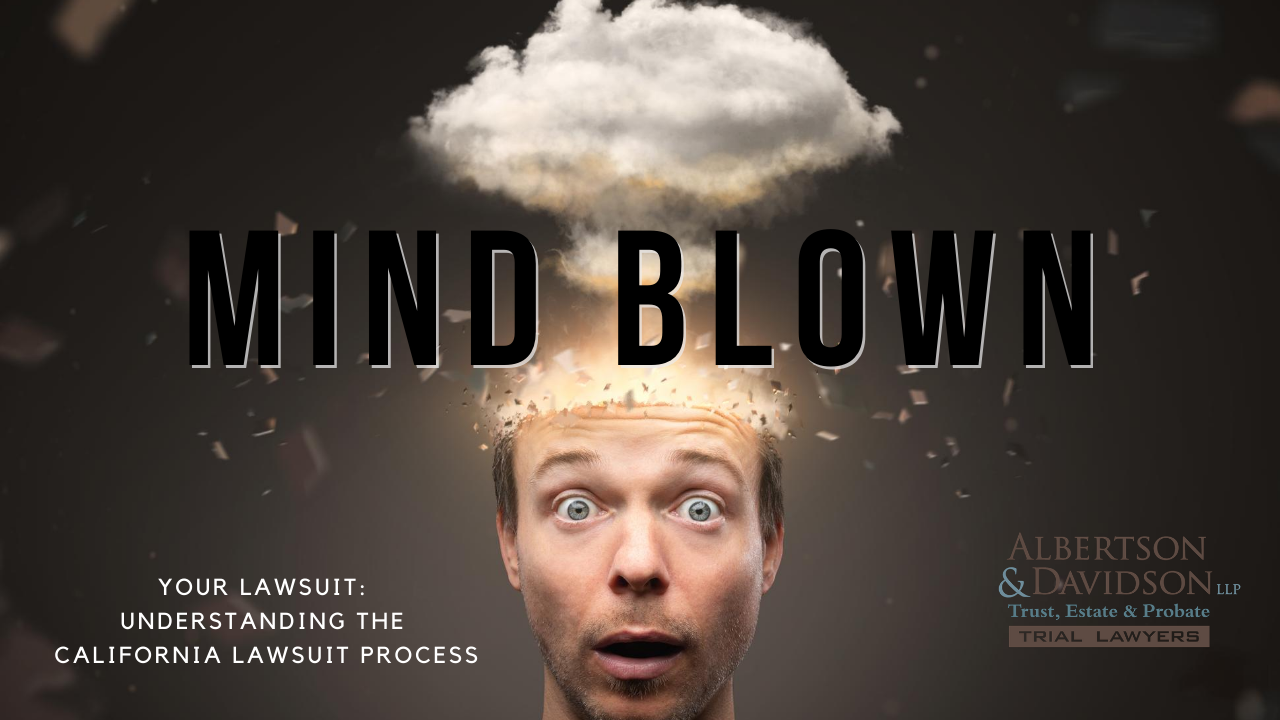
Many people aren’t familiar with our court system and how lawsuits work. For that reason, we wrote a book called Your Lawsuit. This book is an overview of the general litigation process in California. This book walks you through the different phases of your lawsuit.
Below is a brief overview of the phases of a lawsuit.
The Pleading Phase
The first phase is the pleading phase. A pleading is the paperwork filed with the court which initiates your lawsuit. In civil court, the initial pleading is called a complaint. In probate court, the initial pleading is called a petition.
Pleadings must meet certain legal requirements. The pleading must contain the names of the parties, a statement regarding why the jurisdiction and venue is proper in that particular court, a statement of the background facts, the causes of action (the set of facts sufficient to justify the legal right to file the lawsuit), notice information for the parties involved, and the prayer for relief (a statement of the specific relief you are requesting from the court). In probate court, pleadings typically must also include a verification from the client attesting that the facts in the pleading are true to the best of the petitioners’ knowledge.
The Discovery Phase
The second phase is the discovery phase. Discovery is the process of gathering and assembling evidence. Discovery is governed by a specific set of rules and deadlines. Once you file a lawsuit, there are different methods you can use to obtain evidence to prove your case.
Written Discovery
The first type of discovery is written discovery. You generally need documentary evidence to support your allegations in court. Filing a lawsuit gives you the power to force others (even the opposing party) to provide documents to you. You can issue subpoenas to produce documents (even from banking and medical institutions). You can ask written questions (called interrogatories). You can ask people to admit certain facts in writing (called requests for admission).
Depositions
Filing a lawsuit also gives you the power to force the witnesses or the opposing party to testify prior to trial under oath about the events pertinent to the lawsuit. This is called a deposition. In a deposition, you (or your attorney) can sit down with a witness in front of a court reporter and ask questions. Depositions are transcribed with the court reporter, so you have a record of what the witness said. Often, depositions are videotaped. If you catch the witness or opposing party in a lie, or the witness later contradicts themselves, you can use the deposition transcript or video to show inconsistencies.
The Settlement Phase
The third phase is the settlement phase. After evidence is gathered in the discovery phase and the parties have had a chance to further evaluate the strengths and weaknesses of their case, the parties typically attend a mandatory settlement conference or mediation. Almost all cases will go to a mediation at some point.
Mediation is a good thing. During mediation, the parties come together and try to resolve the lawsuit prior to trial with the assistance of a trained mediator. During mediation, the parties might come to an agreement to resolve the case. If the parties don’t settle, they might learn some new information about their case. Most mediators are retired judges who have likely dealt with similar cases many times and can help the parties understand the strengths and weaknesses of their cases. It is estimated that over 90% of civil cases settle prior to trial. If the parties do not settle at mediation, they move on to the trial phase.
The Trial Phase
The final phase of a lawsuit is the trial. During the trial, the parties must present evidence to the court to support their claims or defenses. This evidence can include documentary evidence and the testimony of the parties and witnesses. After the hearing, the judge or jury will make a ruling.
After the trial, the losing party might file an appeal to a higher court. Appeals courts only review questions regarding the application and interpretation of law.
How Long Will It Take?
It is important to keep in mind that courts are always backlogged. Regardless of which type of lawsuit you file, it will take a while for your case to be resolved through the court system. Typically, it takes between eight to 20 months to resolve a lawsuit, and longer in certain instances.
Partner Stewart Albertson likes to say that a lawsuit is a marathon, not a sprint. If you file a lawsuit, be prepared to pace yourself as you and your lawyer make your way through the phases of litigation.
